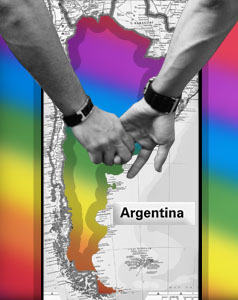Tomorrow, December 1, Álex Freyre, 39 years old, and José María di Bello, 41, have an appointment at the civil registry office in Buenos Aires. They are to become the first husband and husband in Argentina. After an initial rejection from the registry office, a city court judge accepted the couple’s appeal, the mayor’s office did not issue a complaint and Catholic organizations have run out of time to file a new lawsuit. Álex and José María are about to become the first gay couple to marry not only in Argentina, but in all of Latin America. Sitting at the only gay hotel in the San Telmo neighborhood of Buenos Aires, Freyre and di Bello do not attempt to conceal their surprise or their joy, even though the two activists are still nervous that, at the last minute, someone will devise some legal trick to hold up the ceremony.
Freyre and di Bello believe that Argentina’s constitution does not define marriage as an institution to be shared only between a man and a woman. Accordingly, they went to the registry office in Buenos Aires to submit their request for a license, as four other gay and lesbian couples had done in the past. This time, however, after receiving the usual “no,” the couple decided not to appeal to the civil courts, where things move very slowly, but rather decided to bring their case to the city court. And there, on November 13, Judge Gabriela Seijas delivered the surprising ruling that the Registry Office of Buenos Aires was required to validate the union.
The next surprise for the couple came when the city’s mayor, Mauricio Macri, of the center-right PRO party, did not attempt to veto the decision. By the time the Catholic Church became aware of the situation, the deadline for filing an appeal had passed. Jorge Beroglio, archbishop of Buenos Aires, stated that the ruling was “absolutely illegal,” and that the city government had “gravely failed” in its obligation to the people. An association of Catholic lawyers is studying the case, but as the days pass, the impending marriage date still stands.
Freyre and di Bello acknowledge that the more conventional legal route would have been to first approve a national law that offered a clear interpretation of the Argentinian constitution regarding the subject. “A group of politicians have put forth a proposal, but discussions in Congress have come to a standstill,” Freyre and di Bello said. Many politicians of the majority party support the initiative, but the administration of Cristina Fernández de Kirchner has assumed an ambiguous attitude. “The ruling of the city court judge will help to move things along,” Freyre said.
“We want to get married because we love each other and because we have been together since 2005, but we also recognize that this is no longer just about us and our families, who support us, but rather this stands as a blow against the homophobia that exists throughout Latin America,” Freyre said.
If the Catholic lawyers are unable to come up with a means of stopping it, tomorrow’s wedding will be a veritable party in Buenos Aires, with dozens of political and artistic personages wishing to attend and sign as witnesses.
“We want to express our gratitude to Spain, which helped pave the way for couples like us,” the couple said.
Freyre and di Bello, both carriers of HIV who wear red ribbons to symbolize the fight against AIDS, joke around about the moral values lecture they have received from the Catholic Church. “They should deal with it like my father,” Freyre said, “who is a conservative and just wants me to get married.”
Translation: Ryan Croken.
Ryan Croken is a freelance writer and editor based in Chicago. His essays and book reviews have appeared in The Philadelphia Inquirer, Z Magazine and ReligionDispatches.org. He can be reached at [email protected].
